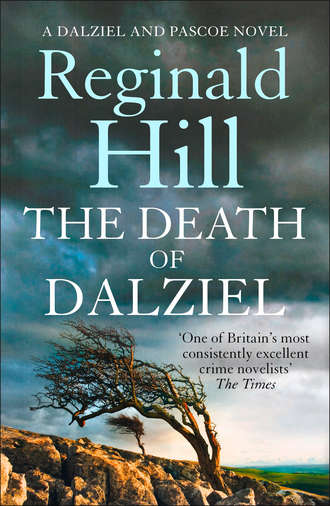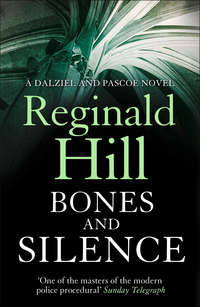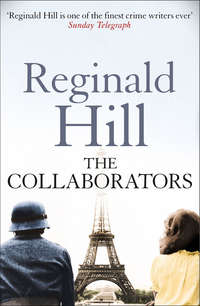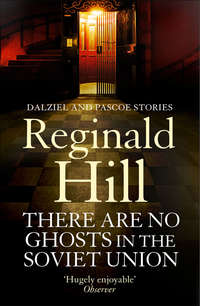
Полная версия
The Death of Dalziel: A Dalziel and Pascoe Novel
‘What are you grinning at?’ demanded Ellie.
‘Just smiling with pleasure at having you here,’ he said.
‘I hope so. I can’t stay long. Rosie’s rehearsal finishes at seven.’
Pascoe shuddered. Public performances by the school orchestra in which his daughter played the clarinet were bad enough. He couldn’t bear to think what a rehearsal must sound like.
‘Didn’t she want to visit me?’ he asked plaintively.
‘Of course she did. But no point in traumatizing the kid. I wanted to be sure you weren’t going to be too much of a shock to the system, so I told her the hospital had banned child visits till tomorrow.’
‘I’ll be coming home tomorrow,’ protested Pascoe. ‘I really do feel fine, no matter what the amateur psychiatrists say.’
‘Let’s wait and see what John says,’ said Ellie. ‘They may need to do more tests.’
‘You know me,’ said Pascoe confidently. ‘Show me a test, I sail through it.’
‘Yeah? Well let’s try this one,’ said Ellie.
She leaned forward and kissed him long and hard, at the same time slipping her hand beneath the bed sheet.
After about thirty seconds she pulled back and said, ‘Yes, you seem to be making firm progress.’
‘Better than you imagine,’ said Pascoe rather hoarsely. ‘Test me again.’
‘I think once is enough at this stage in your convalescence,’ she said primly.
‘You reckon? Do you think the NHS trains its nurses in this technique?’
‘Yes, but you need BUPA for that. By the way, that nice matronly woman with the Scottish accent, who is she exactly?’
‘Sandy Glenister? She’s a Chief Super from the anti-terrorist unit.’
‘I thought that’s what she said, but I wasn’t paying too much attention.’
‘So what did you talk about?’
‘I don’t know. You, I suppose.’
‘Me?’ said Pascoe, alarmed. ‘What did you tell her?’
‘What do you think I told her?’ retorted Ellie indignantly. ‘Where you’ve stashed all that drug money you’ve stolen? I was upset, believe it or not, and she was kind.’
‘Yes, I’m sorry,’ said Pascoe placatingly. ‘She does seem very kind. All the same, better check your purse and change your PINs.’
Ellie smiled the smile of a woman confident that no one of either sex could sweet-talk her out of anything she didn’t want to give.
‘I’d better go,’ she said, looking at her watch. ‘Last time I was late picking Rosie up from rehearsal, I found her sitting on the school wall, playing her clarinet. There was some change on the ground in front of her, but I suspect she’d put it there herself.’
‘Pity,’ said Pascoe. ‘Nice if she could be self-supporting. Give her my love. And tell her I’ll see her tomorrow.’
‘Yeah. Pete, what shall I tell her about Andy? I think she needs to know how bad things are, just in case…’
‘In case what?’ snapped Pascoe. ‘Sorry. Tell her the truth; that’s what we’ve always tried, isn’t it? But keep it cool, yes?’
‘Sure,’ she said. ‘By the way, they gave me what was left of your clothes. I went through your trouser pockets before I dumped them. Found a dental plate.’
‘It’s Andy’s,’ he said. ‘Clean it up, will you? He’ll want it when…’
His voice creaked into silence.
‘I’ll clean it,’ said Ellie, stooping to kiss him. ‘Now I’ve got to dash. But you won’t be lonely. I think I spotted another visitor lurking.’
She grinned as she spoke and a few moments later Pascoe realized why. The door slowly opened and a dolorous visage appeared, its brow puckered with uncertainty, like a sheep contemplating a gap in the hedge which separated its field from a busy motorway.
‘Hector,’ he said. ‘Nice of you to visit. Or are you just looking for the lavatory?’
He was surprised to hear himself make the joke. Usually he made a conscious effort not to join in the friendly piss-taking which Hector provoked among his colleagues.
Maybe somewhere deep inside, or not so deep, I blame him, he thought. If it hadn’t been for Hector, none of this would have started. Or if someone else had started it, then perhaps Dalziel would have taken it more seriously. Or…
He pushed the thoughts aside and forced a smile.
‘Come in then,’ he said. ‘Have a seat.’
Slowly Hector advanced. Like many lanky men, he walked with his head held low and thrust forward, as if to distract attention from his height. At moments of maximum uncertainty, which were many, the posture was so exaggerated that he put Pascoe in mind of those men whose heads do grow beneath their shoulders that Desdemona seemed to find a turn-on. Dalziel, less literary but in his own way just as poetic, had once said to him, ‘For God’s sake, straighten thyself up, lad. You look like someone’s hung your tunic on a coat hanger with you still in it!’
Perched on the edge of the chair, he stared fixedly at Pascoe.
‘So,’ said Pascoe heartily. ‘And how are things down at the factory? I mean, the Station. The Police Station.’
It was as well to be precise in your intercourse with Hector.
‘OK,’ said Hector. ‘I mean, everyone’s dead worried about you and Mr Dalziel, but.’
‘Are they? Well, you can tell them I’m doing fine. And the Super, well, we’ll just have to wait and see.’
There followed a long silence and Pascoe was thinking about bringing the visit to an end with a plea of fatigue when Hector burst out, ‘Is it true he’s going to die, sir?’
‘I hope not,’ said Pascoe, touched by the degree of concern shown. ‘But I’m afraid he is very ill. Look, Hector, you shouldn’t blame yourself…’
‘Blame who, sir?’ said Hector, screwing up his eyes in the effort of concentration.
Whoops, thought Pascoe. Got that wrong, didn’t I. Whatever’s bothering Hector, it’s not a sense of guilt.
‘Blame anyone,’ he said. ‘It’s no one’s fault. Just one of those awful things that can happen to anyone.’
Hector nodded vigorously, very much at home with the concept of awful things that could happen to anyone but which for some reason were more likely to happen to him.
‘I gather you’ve been talking to Mrs Glenister,’ Pascoe went on; then, observing a familiar blankness spreading across Hector’s face, he added, ‘Chief Superintendent Glenister from the anti-terrorism unit.’
‘Glenister?’ said Hector. ‘Joker said her name were Sinister. Her who speaks funny?’
Deafness clearly hadn’t affected Constable Jennison’s love of a laugh, thought Pascoe, for which I suppose we ought to be grateful.
‘Yes, she does. It’s called a Scottish accent. That’s Mrs Glenister all right. I hope you were able to help her.’
‘Oh yes,’ said Hector, very positive. ‘Kept on asking about the men I saw in the shop. Asking and asking. I started getting a bit confused but Mrs Sinister—sorry, Mrs Glenister—said not to worry as the men I saw must have got blown up anyway. Then she helped me with my report.’
‘That was nice of her,’ said Pascoe. ‘And it’s nice of you to come visiting. But I’m a bit tired now, Hector…’
He paused and started counting to fifty. Dropping a hint to Hector was like turning on an old-fashioned wireless. You had to wait for the valves to warm up.
At forty-six, Hector stood up and said, ‘I’d best be going.’
He took a step towards the door. then turned back.
‘Nearly forgot,’ he said. ‘Brought you this—’
Out of the depths of his tunic jacket he took a paper bag which he placed carefully on the bedside locker. Then he set off again, this time reaching the door before he halted once more.
‘Sir,’ he said. ‘I hope Mr Dalziel doesn’t die. He’s been very good to me.’
Then he was gone, leaving Pascoe only a little less amazed than he would have been if the angel Gabriel had popped in to tell him he’d been chosen to have a baby.
He settled back into his pillows to contemplate the nature of the Fat Man’s goodness towards Hector, noticed the paper bag on his locker, reached out and picked it up.
It contained, rather squashed but not beyond recognition, a custard tart.
‘Oh shit,’ said Pascoe.
And suddenly for some reason beyond reason, the barrier he’d been erecting both consciously and unconsciously between himself and the events in Mill Street crumbled like the walls of Number 3, and when the nurse looked in to check that all was well, she found him with his face buried in his pillow, sobbing convulsively.
Part Two
The Days that we can spareAre those a Function dieOr Friend or Nature—stranded thenIn our EconomyOur Estimates a Scheme—OurUltimates a Sham—We let go all of Time withoutArithmetic of him—
Emily Dickinson, ‘Poem 1184’
1 a tidy desk
On the third day, there were many in Mid-Yorkshire not normally noted for their religious fervour who would have been unsurprised to hear that Dalziel had taken up his hospital bed, hurled it out of the window, and walked away.
But in an age of digital TV and the mobile phone, commonplace miracles have gone out of fashion, so the day dawned and departed with the Fat Man still comatose.
Pascoe, on the other hand, did manage to rise and limp away, not through divine intervention, but by dint of nagging Dr John Sowden into discharging him, though only on the strict understanding that he took a minimum of seven days convalescent leave.
On his second day home he announced his intention of dropping in at work to see how things were going.
Ellie’s objections were forceful in expression and wide in range, starting with medical diagnostics and ending with reflections on his mental stability. When she paused for breath, Pascoe said, ‘You’re absolutely right, love. About everything. Only, I feel that, here at home, I’m not pulling for Andy. I know it’s daft, and me going back to work isn’t going to make the slightest difference. But somehow it feels like it might.’
Ellie said, ‘You and your daughter, you’re both mad. But you’d better go. It’s going to be bad enough if the fat bastard dies without you feeling personally responsible.’
In her mind, Ellie had already given up on Dalziel and was gathering her strength to deal with the aftermath of his death. She did not doubt it would be traumatic, like losing a…Here her imagination failed her. Like losing what? No human simile fitted. Humans went. It was their nature. You grieved. You got on with living. But Dalziel, when he went it would be like losing a mountain. Every time you saw the space where it had been, you’d be reminded nothing was for ever, that even the very majesty of nature was only smoke and mirrors.
If anything she was more worried about her daughter than her husband. Peter knew that his reaction was daft. OK, he still went ahead, but he knew. Rosie, by contrast, had reacted to the news of Uncle Andy’s coma with apparent indifference. When Ellie had gently tried to make sure she understood the seriousness of the situation, she had reversed the roles and with the patience of mature experience addressing childish uncertainty replied. ‘Uncle Andy will wake up when he wants to, don’t you see?’
Ellie had promised herself when Rosie was born that she would never be anything but completely honest with her daughter. Often her resolution had been strained close to breaking point, but she’d always tried. Now she nodded and said, ‘Let’s hope so, love. Let’s hope so. But he is very ill and we’ve got to face it: maybe he’s so ill that he wouldn’t want to wake up, and he’ll just die. I’m sorry.’
Her words clanged dully in her own ears, but Rosie’s expression didn’t change.
‘That doesn’t matter,’ she exclaimed. ‘He’ll still wake up when he’s needed.’
Like King Arthur, you mean? thought Ellie. Or, perhaps more aptly, the Kraken?
But she said no more. What else was there to say but the clichés of comfort? And the time for them, though close, had not yet arrived.
So, leaving behind a wife absolute for death and a daughter buoyed up by a sure and certain hope of resurrection, Peter Pascoe returned to work.
Determined to conceal any evidence of debility, as he approached the CID suite he took a deep breath which proved rather counterproductive, sending a spasm of pain through his rib cage that made him momentarily let up on the effort of will necessary to control his left knee.
Thus the first sight his junior colleagues had of him, he was limping, wincing and breathing hard. Edgar Wield followed him into his office and said anxiously, ‘Pete, you OK? I thought you were laid up for a week at least.’
‘Bloody quacks, what do they know?’ said Pascoe roughly. ‘Right, Wieldy, bring me up to speed.’
‘Not a lot’s changed,’ said the sergeant. ‘Three more break-ins up on Acornboar Mount; spate of credit-card fraud—looks like someone’s recording PINS; couple of muggings; an affray outside the Dead Donkey—’
‘Jesus, Wieldy!’ interrupted Pascoe. ‘That’s not what I’m worried about. Someone blew up half a street, three dead, Andy lying in a coma, that’s the only case I’m interested in. So what’s the state of play there?’
Wield shrugged and said, ‘Sorry, out of our hands. You’ll need to talk to CAT. Dan’s told us to co-operate fully. So far that’s meant pointing Glenister and her men towards the best pubs and restaurants.’
Dan was Chief Constable Dan Trimble.
‘So he’s had his arm twisted,’ said Pascoe. ‘Two can play at that game.’
He reached for the phone.
Wield said, ‘Actually, he’s here. In Andy’s room, I think…’
‘Andy’s room? What the hell’s he doing in there?’ demanded Pascoe.
‘Well, he is the chief constable…’ began Wield, but he was speaking to Pascoe’s back as the DCI headed out of the door.
He didn’t bother to knock when he reached Dalziel’s office but burst in.
‘Peter!’ said Sandy Glenister, her round farmer’s-wife face lighting up with a welcoming smile. ‘Good to see you. We were just talking about you, weren’t we, Dan?’
‘Er, yes. But I wasn’t expecting…Shouldn’t you still be on sick leave?’ said Chief Constable Trimble.
Glenister was sitting in Dalziel’s extra-large chair behind a desk which was as clear and tidy as Pascoe could recall seeing it. Trimble was sitting opposite her so that he had to twist round to look at the newcomer.
‘I’m fine, sir,’ said Pascoe shortly. ‘Couldn’t lie around when there’s so much to do. Who have we got heading up the Mill Street investigation, sir?’
‘That would be me, I think,’ said Glenister.
‘No, I meant from our side,’ said Pascoe.
‘Our side? I hope that’s what I’m on too.’ She smiled.
‘Sir?’ said Pascoe, addressing himself pointedly to Trimble.
The Chief eyed him speculatively, decided to make allowances and said, ‘Peter, in view of the national security aspects of the business, I think it’s reasonable that we follow Home Office guidelines and let the specialists deal with the investigation—’
‘Sir!’ interrupted Pascoe. ‘There’s been a major incident on our patch, we’ve got bodies, Mr Dalziel’s in a coma, the people of Mid-Yorkshire, our constituents, will be expecting their own police force to provide answers. The local media will want to see faces they know, not listen to the meanderings of some imported spin doctor. Our own men need to feel they’re involved instead of being sidelined by a bunch of—’
‘Enough, Chief Inspector!’ said Trimble, rising.
He wasn’t a very big man, but even Dalziel grudgingly allowed that, when he wanted, Trimble could be quite formidable. Clearly he wanted now.
‘Decisions have been made. Your job when you return officially to work will be to follow and to implement them. I’m sure that Chief Superintendent Glenister will keep you informed of progress, on a need-to-know basis, of course…’
‘You mean there may be things relating to criminal activity in Mid-Yorkshire that I don’t need to know?’ exclaimed Pascoe incredulously. ‘Has there been a change of government or what?’
Trimble went fiery red. But before he could reply, Glenister said, ‘Hey, come on, you two! My da used to say that the English were a cold, unfeeling race, no passion. He should be here now! Dan, Peter’s quite right. I’d feel the same in his position. Home Office guidelines! What do those wankers know about life at the sharp end, eh? And I could do with all the help I can get. Why don’t you leave me and him to get acquainted and work out a modus operandi?’
The chief constable thought for a moment, during which his cheeks cooled to their normal healthy glow.
‘That sounds reasonable,’ he said. ‘But if you should decide that in your estimation the chief inspector needs to rest for the full term of his prescribed convalescence, just let me know.’
He left.
Pascoe said, ‘You and the Chief seem to be very close.’
‘Oh yes, we go way back, me and Dan,’ said the woman. ‘Started out together in the days of auld lang syne.’
And now, thought Pascoe, Dan’s chief constable and you’re chief super which, making allowances for what Andy called the handicap of tits and twat in the police promotion stakes, puts you several lengths ahead. Definitely one to watch.
She stood up and came round the desk to his side.
‘Anything new on Mr Dalziel?’ she asked.
He shook his head.
‘Well, while there’s life…Sorry if that sounds banal but, at times like this, there’s no gap between banal and pretentious. I found that out when I lost my man. Banal’s sincere; pretentious means they don’t give a damn.’
‘Your…man, was he job?’
‘Oh yes. Funny really. We’d been married seven years. I was at the point where I really had to decide, kids or career. Then I woke up one morning realizing I could have both. Just as me and Colin would share the kids, so we’d share his career, which looked set to be glorious. It all seemed so obvious. I’d never felt so happy. And that of course was the day it happened.’
She fell silent. Pascoe didn’t ask what happened. Her motives for telling him this much were obscure. If she wanted to tell him more, she would.
After a while he said, ‘I’m sorry.’
‘Thank you. So am I. On the other hand, if it hadn’t been for that, I wouldn’t be here now. Peter, why don’t you sit there?’
She indicated the chair behind the desk which she’d just vacated.
‘If anyone should keep this seat warm, it’s you,’ she said. ‘I’ve got an Ops room down the corridor. Dan asked me if I’d sit in here if I had any spare time. With his two best CID officers out of the frame, I think he wants someone senior to make sure things keep ticking over. I didn’t much care for the idea, but, like I say, he’s an old friend…’
She smiled the smile of someone who finds old friends hard to refuse.
In fact, guessed Pascoe, what she was probably doing was checking through Andy’s files to see if there was anything there which tied in even remotely with the events in Mill Street. She’d be lucky. Dalziel’s system of paperwork was sibylline.
Left to himself he would have been reluctant to take over the Fat Man’s seat, but now he refused to play coy.
He sat down, looked around and said, ‘Some-one’s been tidying up.’
‘Me, I’m afraid. The way I work. Set things in order, then you’ll see what they mean. Your Mr Dalziel, from all accounts, belongs to the opposite school. Ignore chaos and ultimately its meaning will come looking for you.’
‘I think rather he had…has…the ability to set things in order in his mind, but reckons that chaos has its meaning too,’ said Pascoe.
‘Meaning now I’ve put stuff where it ought to be, he won’t be able to find a thing,’ she laughed. ‘Anyway, here’s the deal, Peter. You’ll have full access to my Ops room. I’ll have full access anywhere I care to go in CID. I’ll consult with you first before using anything I think may be relevant. And I expect you to return the courtesy.’
Seated at Dalziel’s desk, it occurred to Pascoe that the proper response would be to say he didn’t take kindly to folk offering to do him favours on his own CID floor, but he swallowed the words and said as mildly as he could manage, ‘That sounds reasonable. Why don’t we stroll along to your Ops room now and you can bring me up to speed?’
He rose, went to the door, opened it, and stood there to usher her out.
For a moment she looked slightly non-plussed at the speed with which he was moving things along, then gave him the open matronly smile again and moved through the doorway.
The CAT Ops room bore the Glenister trademark. It was as tidy and well organized as she’d left Dalziel’s desk. Three computers had been set up on a trestle table at the far end. Not a spare inch of power cable showed. On a wall-board were pinned six photos, three showing the remains found in the ruins of Mill Street, each connected to a headshot of a man, two of them distinctly Asian in colouring and feature, the third less so. Beneath each photo was a name. Umar Surus, Ali Awan, and Hani Baraniq.
‘Surus and Awan are positive ID’s,’ said Glenister. ‘We have dental records and, in Awan’s case, DNA. Baraniq isn’t positive yet but we’re eighty per cent sure.’
‘You’ve shown these pics to Hector?’
‘Naturally. Could be his “sort of darkie” was Awan, and the other possibly Baraniq, though he’s even vaguer there. I’ve tried to push him beyond “sort of funny, not so much a darkie”, but no luck. I hope we never have to put poor Hec up on the witness stand.’
She spoke with a smile.
Pascoe thought, Two minutes on our patch and already she’s making our jokes.
He said, ‘Look, what Hector doesn’t see is most things. But what he says he does see, you can usually rely on. His shortcomings are verbal rather than optical.’
This wasn’t just a knee-jerk Hector-might-be-an-idiot-but-he’s-our-idiot reaction. Pascoe had once spotted Hector sitting on a park bench, notebook open on his knee, eyes fixed on a pair of sparrows dining on a discarded cheeseburger.
‘Making notes in case you have to arrest them, Hec?’ he’d enquired jocularly as he came up behind.
Hector had reacted as if caught committing an indecent act, jumping up so fast he dropped his pencil stub, all the while regarding Pascoe as if he carried a flaming sword. At the same time, he was ripping the page out of his notebook, but not before Pascoe glimpsed what looked like a sketch of the two birds.
‘Can I have a look?’ Pascoe had asked.
With great reluctance Hector had handed the sheet over.
Smoothed out, it revealed what proved to be a lively and accurate depiction of the feeding sparrows.
‘Please, sir, you won’t tell anyone, please,’ said Hector tremulously.
‘This is good,’ said Pascoe, returning the sketch. ‘I didn’t know you could draw, Hec.’
‘But you won’t tell anyone,’ repeated the constable anxiously.
It now struck Pascoe that it wasn’t being reported for misuse of his official notebook that bothered Hector so much as the idea of his colleagues knowing that he drew pictures. Everyone needs a secret, he thought. Most of us have too many. But if you’ve only got the one, how precious must that be.
‘Of course I won’t,’ he said. ‘Carry on, Constable!’
And he’d kept his word, not even sharing Hector’s secret with Ellie.
So he certainly wasn’t going to be specific with Glenister, who said doubtfully, ‘If you say so, Peter. Now, is there anything else we can bring you up to speed on?’
‘Maybe…’
He went to the computer table and tapped the shoulder of the operator who looked to have least happening on his screen.
‘Could you bring me up the Mill Street SOCO file?’ he said.
The man glanced up at him, blank faced. Blank was the right word here. He had a regularity of feature which made you think android. His mirror and photographic images were probably indistinguishable. In his thirties, Pascoe guessed, but metro-thirties rather than up-north-thirties. The jacket draped over the back of the chair and his open-necked shirt said bet-you-can’t-afford-me loud and clear. His blond hair had more gel in it than Dalziel would have let pass without some crack about an oil change. And he had eyes the colour of slate and just as hard.









